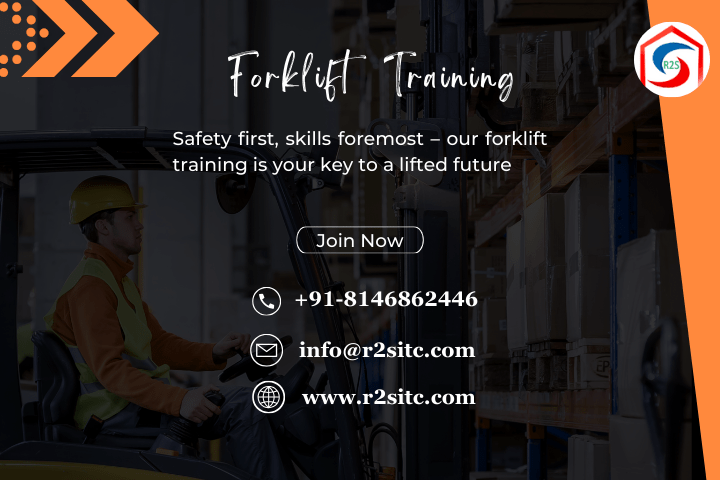Introduction
In the dynamic world of material handling and logistics, forklifts stand as indispensable tools. However, ensuring the safe and efficient operation of these powerful machines requires more than just a basic understanding. This blog will delve into the critical aspects of forklift training, exploring the variation, benefits, and industry standards. At the peak of this discussion is R2SITC, a leading provider of forklift training services, whose commitment to excellence transforms novices into skilled operators.
The Importance of Forklift Training
1. Safety First: Forklift training is important for creating a safer work environment. Proper training reduces the risk of accidents and injuries related to forklift operation.
2. Legal Compliance: Many authority require forklift operators to undergo formal training and certification. Compliance with regulations ensures a lawful and accountable workplace.
3. Risk Mitigation: Forklifts pose significant risks due to their size, weight, and handling capabilities.Training teaches operators how to identify and mitigate potential risks, reducing the likelihood of accidents.
4. Equipment Efficiency: Well-trained operators are more proficient in handling forklifts, leading to increased operational efficiency.Proper training results in better use of equipment and resources.
5. Preventing Damage to Goods: Skilled forklift operators are less likely to damage goods during handling and transportation.Training highlight load stability and proper handling techniques.
6. Enhanced Productivity: Efficient and skilled forklift operators contribute to overall workplace productivity.Proper training allows operators to navigate tasks more swiftly and accurately.
7. Cost Savings: Training reduces the risk of accidents, which can lead to costly repairs and medical expenses.Investing in training upfront can result in long-term cost savings.
8. Increased Employee Confidence: Properly trained operators feel more confident in their abilities.Confidence contributes to a positive work environment and fosters a culture of safety.
Anatomy of Forklift Training
From Basics to Mastery
In this section, we’ll dissect the complex process of forklift training, guiding individuals from fundamental knowledge to mastery. Understanding the anatomy of forklift training is essential for transforming novices into proficient and skilled operators.
1. Fundamentals of Forklift Operation:
Introduction to Forklift Components: Explore the basic components of a forklift, including the mast, forks, carriage, and hydraulic systems. Understanding these components is fundamental to operating the equipment safely.
Vehicle Inspection Protocols: Highlight the importance of pre-operation inspections. Trainees learn to conduct thorough assessments of forklifts to ensure that all components are in optimal working condition before operation.
2. Work Techniques:
Basic Controls Familiarization: Introduce trainees to the forklift controls, including steering, acceleration, and braking systems. Develop a solid foundation in basic work to navigate confined spaces with precision.
Advanced Work Skills: Progress to advanced techniques such as turning in tight spaces, reverse maneuvers, and precise positioning. Training in these skills enhances an operator’s ability to handle diverse workplace layouts.
3. Load Handling Procedures:
Load Identification and Assessment: Teach operators how to assess different types of loads, considering weight, dimensions, and stability. Understanding load characteristics is crucial for safe and efficient handling.
Lifting and Lowering Techniques: Provide step-by-step guidance on lifting and lowering loads, emphasizing balance and load center principles. Mastery of these techniques ensures safe material handling practices.
4. Safety Protocols and Best Practices:
Understanding Center of Gravity: Educate trainees on the concept of the center of gravity and its impact on forklift stability. This knowledge is essential for preventing tip-overs and maintaining a secure work environment.
Emergency Procedures: Cover emergency protocols, including what to do in the event of a tip-over, equipment malfunction, or other unforeseen circumstances. Training in emergency procedures enhances operators’ preparedness.
Safety First: Forklift Training Protocols
Certainly! Here are some key points regarding forklift training protocols for safety:
1. Formal Training Programs: Confirm all forklift operators undergo formal training programs.Training should cover both theoretical and practical aspects of forklift operation.
2. Qualified Instructors: Training should be conducted by qualified and experienced instructors. Instructors should have a thorough understanding of forklift operations and safety procedures.
3. Written Tests and Evaluations: Conduct written tests to assess operators’ understanding of safety rules and operating procedures. Practical assessment should also be performed to gauge hands-on skills.
4. License and Certification: Issue licenses or certifications to operators who successfully complete the training program. Regularly renew certifications to ensure ongoing competence.
5. Age and Health Requirements: Ensure operators meet age requirements and are in good physical health. Regular health check-ups may be necessary for forklift operators.
6. Equipment Familiarity: Operators should be familiar with the specific forklift models they will be using.Training should cover basic maintenance and inspection procedures.
7. Load Handling Techniques: Teach proper techniques for lifting, lowering, and transporting loads.Emphasize the importance of load stability and weight limits.
8. Pedestrian Safety: Highlight awareness of pedestrians and other workers in the vicinity. Establish clear pedestrian pathways and warning systems.
9. Speed Limits and Traffic Rules: Set and enforce speed limits for forklift operations. Define traffic rules within the facility to prevent collisions.
10. Emergency Procedures: Train operators on emergency procedures, including how to respond to accidents and spills. Provide instruction on using safety equipment and communication systems.
11. Seat Belt Usage: Emphasize the importance of wearing seat belts while operating a forklift.Verify that seat belts are in good condition and used at all times.
12. No Unauthorized Modifications: Prohibit operators from making unauthorized modifications to forklifts. Any modifications should be approved by qualified personnel.
13. Continuous Training: Implement ongoing training programs to keep operators updated on new equipment, regulations, and safety practices. Regularly review and reinforce safety protocols.
14. Reporting and Documentation: Establish a system for reporting incidents, near misses, and equipment defects. Maintain thorough documentation of training records and safety inspections.
15. Supervision and Accountability: Ensure that trained operators are supervised, especially if they are new or inexperienced. Hold operators accountable for adhering to safety protocols.
R2SITC – Elevating Forklift Training
A Pioneer in Training Excellence
Comprehensive Training Programs: R2SITC offers top-notch forklift training programs designed to cover both theoretical and practical aspects of forklift operation.The schedule is crafted to instill a deep understanding of safety protocols, equipment handling, and industry best practices.
Cutting-edge Facilities: Experience state-of-the-art training facilities equipped with the latest forklift models. Practical training areas mimic real-world scenarios, providing operators with a hands-on learning experience in a controlled environment.
Expert Instructors: R2SITC takes pride in its team of expert instructors, bringing a wealth of industry knowledge to the training landscape. Instructors are qualified and experienced, ensuring that operators receive high-quality, relevant, and up-to-date training.
Focus on Safety: The training programs highlight safety as a top priority, covering all essential aspects of forklift safety protocols. From load handling techniques to emergency procedures, operators are equipped to navigate any challenges with a safety-first mindset.
Industry Recognition: R2SITC has earned a reputation for producing skilled and safety-conscious forklift operators.The training programs align with industry standards, leading to certifications that are recognized and respected across the sector.
Ongoing Professional Development: R2SITC doesn’t just stop at opening training; they believe in continuous learning. Ongoing professional development programs keep operators updated on the latest equipment, regulations, and safety practices, ensuring a workforce that evolves with the industry.
Why Choose R2SITC?
1. State-of-the-Art Training Facilities
2. Exceeds Industry Standards
3. Expert Instructors
4. Safety-First Approach
5. Industry Recognition and Certifications
6. Ongoing Professional Development
7. Customizable Training Solutions
8. Proven Success Stories
9. Innovation in Training Approach
10. Industry Leadership
Conclusion
The study of forklift training underscores the foremost importance of high-quality training programs in the realm of forklift operations. The critical role played by forklifts in various industries necessitates a comprehensive and safety-focused approach to training. The perfect standards set by institutions like R2SITC, with their state-of-the-art facilities, expert instructors, and commitment to exceeding industry standards, showcase the transformative impact of quality training. Forklift operators, equipped with in-depth knowledge and hands-on experience, are not only compliant with regulations but also contribute significantly to the overall success and safety of operations. The importance on continuous learning, a safety-first mindset, and customizable solutions further highlights the dynamic and evolving nature of forklift training, ensuring operators are well-prepared for the unique challenges of their work environments. Ultimately, investing in top-tier forklift training is an investment in operational excellence, workplace safety, and the sustained success of industrial endeavors.
About R2SITC
In the world of forklift training, R2SITC stands as a beacon of excellence, embodying a commitment to unparalleled quality and safety. With state-of-the-art training facilities, a curriculum that surpasses industry standards, and a team of seasoned instructors, R2SITC has established itself as a pioneer in elevating forklift operation skills. Their training programs go beyond compliance, emphasizing a safety-first approach, continuous learning, and customization to meet the unique demands of various industries. R2SITC’s graduates not only gain recognized certifications but also contribute to the overall success of operations through enhanced skills and a deep understanding of safety protocols. For those seeking to elevate their forklift operation skills and contribute to a culture of safety and excellence, R2SITC stands as the premier choice. Visit R2SITC today to embark on a transformative journey in forklift training.
Contact Information:
Website: www.R2SITC.com
Phone: +91-8146862446
Email: [email protected]
Visit our Training Center: Hoshiarpur Punjab, India


